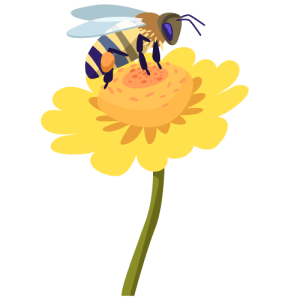The Great Florida Pollinator Census
This year will be the second year Florida will be participating in the Great Florida Pollinator Census under the Great Southeast Pollinator Census (GSEPC). Created by the University of Georgia Extension Services in 2019, the citizen science project has three major goals outlined by its initial creators.
- To create sustainable pollinator habitat by educating gardeners about using plants that provide nutrition for our pollinators while handling our summer droughts and do not have disease or pest insect pressure.
- To increase the entomological literacy of our citizens. As I mentioned to one teacher, we want students to go from “oooo, it’s a bug” to “look at the tarsal claw on that bee!”
- To generate useful data about our pollinator populations, so we can begin to spot trends and see how pollinator populations are affected by weather and how honeybees influence native bee populations.
Now including tens of thousands of participants from the states of Florida, Georgia, South Carolina, and North Carolina, we plan to host it annually at our office, located at Twin Lakes Park. Come join us to learn about pollinators, Florida-Friendly Landscaping™, and citizen science. You can make a difference!
 Why Contribute?
Why Contribute?
Pollinators are precious and powerful. Over 90% of our flowering plants, including many crops, rely on their hard work. Capturing scientific data on pollinator diversity, seasonality, and geographical location are critical in education and conservation efforts. The Great Florida Pollinator Census provides an opportunity for citizen scientists to contribute this important data from the comfort of their home, neighborhood, or community.
How to Participate
When it comes to collecting data, consistency is key! If you plan to participate in this year’s Great Florida Pollinator Census, make sure you have the knowledge and tools to do so. You’ll need to be able to identify between pollinator groups (bees, wasps, flies, butterflies, moths, etc.), use the appropriate datasheet, and upload your data to the GSEPC website. We will provide the information and resources you need at our upcoming event.
Watch the video below to learn more about the census process.
When is the Count?
Join us for this year’s Great Florida Pollinator Census. Training events often include a short lecture, followed by open time to count pollinators in a designated outdoor space.
The Great Florida Pollinator Census will take place from August 22 to 23 this year. Use the list below to find an event near you!
List of Upcoming Events
Northwest District
- Escambia County
- Pollinators and Flowers – August 1 @ 10:15 – 11:00 am
- The Great Southeast Pollinator Census – August 22 @ 10:15 – 11:00 am
- Pollinator Count – August 22 @ 9:00 – 11:00 am
- Washington County
- Count Pollinators With Us – August 22 @ 9:00 am, 12:00 pm, and 3:30 pm
Northeast District
- Alachua County
- ACLD Series: Pollinator Gardening – July 26 @ 2:00 – 3:00 pm
Central District
- Orange
- Gardening for Native Pollinators – August 7 @ 5:00 – 6:00 pm
- Native Plant Workshop – October 24 @ 10:00 am – 12:00 pm
Southwest District
- Hillsborough County
- 4-H Pollinator Count – August 22 @ 4:00 – 4:30 pm
- The Great Southeast Pollinator Census Pollinator Count at TFHC – August 22 @ 10:00 – 11:30 am
- Lee County
- The Great Florida Pollinator Census – August 23 @ 8:30 am – 1:00 pm
- Sarasota County
- The Great Southeast Pollinator Census! – August 22 @ 8:30 – 10:00 am
Southeast District
- Brevard County
- The Great Southeast Pollinator Census in Brevard – August 22 @ 9:00 – 10:00 am
- The Great Southeast Pollinator Census in Brevard – August 23 @ 9:00 – 10:00 am
Online
- Gardening in the Panhandle LIVE! Great Southeast Pollinator Census – Bee a Citizen Scientist! – August 21 @ 12:00 – 1:00 pm
- Pollinator Gardening and Insect Conservation – July 15 @ 2:00 – 3:30 pm
- Gardening for Pollinators Summer 2025 – self-paced
Learn more about the effort at https://gsepc.org/.
 15
15
 Why Contribute?
Why Contribute?
